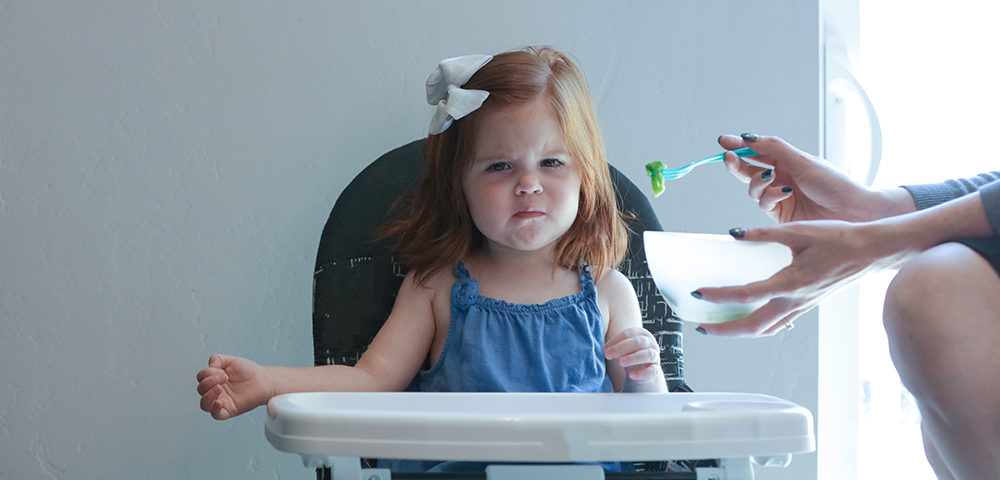Dealing with your toddler’s picky eating can be frustrating, but it’s important to know this is a normal part of development for most children. Picky eating is characterized by a child refusing food based on its taste or texture, or in an attempt to become independent. While this can exasperate parents, children typically outgrow this phase by the time they’re school age. Here are some strategies you can try to help get through this period.
Keep Trying
It’s important to keep trying to get your child to eat new foods, even if he or she didn’t enjoy it the last time. It can take many attempts before a young child is willing to eat new things. You may also try limiting snacks before mealtime to ensure your toddler is hungry and more willing to try something new when it’s dinnertime.
Maintain Routine Family Meal Time
Try to eat with your toddler as a family as much as possible, and on a consistent schedule. You can use this time to model to your child proper behavior when it comes to eating. At the same time, try to avoid distractions such as TV or phones. When selecting the food, try to include at least one food you know your child likes, along with other foods necessary for a balanced meal, whether your child eats it or not.
Don’t Throw Away Unwanted Food
Some children may choose to not eat during a meal, or only take a few bites, but soon after mealtime ask for food again. In this case, it’s a good idea to put the uneaten food in the refrigerator, then bring it out when your child later asks for food. This helps with kids who might try to get smart about not eating at mealtime to wait for a preferred “snack” they might get at another time.
Avoid Bargaining
While it’s tempting to want to offer your child something sweet for dessert or some other reward like a toy or sticker for trying a new food, it’s a bad idea. This can make the reward feel even more exciting, while at the same time making the food you’re attempting to get them to eat feel like a chore. Likewise, threatening punishment for not eating the food is inadvisable. You also don’t want to negotiate and turn dinner into a power struggle.
Empower Self-feeding
By about 15 to 18 months old, most toddlers should try using utensils at mealtimes. Giving opportunities for self-feeding allows children a measure of control over what they eat and when, encouraging development.
Try Smaller Portions
When you fix your child’s plate, try a smaller portion of new foods. This can reduce the intimidation factor of something new for your toddler.
Speaking with a pediatrician about your child’s picky eating is also a good idea. They can help ensure your child is getting proper nutrition to grow and develop, and work on personalized plans. The experts at Pediatric and Adolescent Associates, a Part of Lexington Clinic are here to help. Our fellowship-trained physicians are knowledgeable and compassionate, and have dedicated their lives to helping children and their parents.
About Katrina M. Hood, MD, FAAP
Dr. Katrina M. Hood received her medical degree from the University of Louisville. She then joined the United States Navy and completed her residency in pediatrics at the Naval Medical Center in San Diego, CA. Dr. Hood is board certified in pediatrics and is dedicated to providing excellent medical services in general pediatrics. She enjoys building long standing relationships with her patients, their parents and the community at large.
Dr. Katrina M. Hood can be reached at (859) 277-6102. For help scheduling an appointment or to find the location closest to you, visit LexingtonClinic.com.







